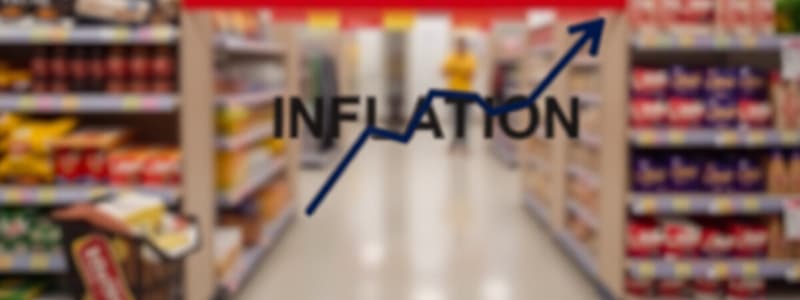Podcast
Questions and Answers
What type of inflation was most severe in Germany following World War I?
What type of inflation was most severe in Germany following World War I?
- Mild inflation
- Stagflation
- Hyperinflation (correct)
- Core inflation
What happens to the purchasing power of savers when inflation exceeds interest rates?
What happens to the purchasing power of savers when inflation exceeds interest rates?
- They lose purchasing power. (correct)
- They gain purchasing power.
- Their money retains the same value.
- They experience increased real gains.
Why is inflation particularly challenging for retirees on fixed incomes?
Why is inflation particularly challenging for retirees on fixed incomes?
- They primarily benefit from higher interest rates.
- Their income fails to adjust for price increases. (correct)
- They spend less on luxury goods.
- They are unaffected by price changes.
How does inflation influence the real value of long-term loan repayments?
How does inflation influence the real value of long-term loan repayments?
What represents the relationship between unemployment and inflation according to the Phillips Curve?
What represents the relationship between unemployment and inflation according to the Phillips Curve?
What does inflation primarily indicate about the economy?
What does inflation primarily indicate about the economy?
How does inflation typically affect the purchasing power of consumers?
How does inflation typically affect the purchasing power of consumers?
Which of the following describes hyperinflation?
Which of the following describes hyperinflation?
Which component is excluded from the Consumer Price Index (CPI)?
Which component is excluded from the Consumer Price Index (CPI)?
What does the core inflation rate exclude?
What does the core inflation rate exclude?
What characterizes a wage-price spiral?
What characterizes a wage-price spiral?
Which factor directly increases inflation in an economy?
Which factor directly increases inflation in an economy?
What kind of inflation occurs due to excessive demand in the market?
What kind of inflation occurs due to excessive demand in the market?
Flashcards
Inflation
Inflation
A general increase in prices across the economy.
Purchasing Power
Purchasing Power
The ability to buy goods and services with a given amount of money.
Hyperinflation
Hyperinflation
A rapid and uncontrollable increase in prices.
Consumer Price Index (CPI)
Consumer Price Index (CPI)
Signup and view all the flashcards
Core Inflation Rate
Core Inflation Rate
Signup and view all the flashcards
Wage-Price Spiral
Wage-Price Spiral
Signup and view all the flashcards
Demand-Pull Inflation
Demand-Pull Inflation
Signup and view all the flashcards
Cost-Push Inflation
Cost-Push Inflation
Signup and view all the flashcards
Hyperinflation in Germany
Hyperinflation in Germany
Signup and view all the flashcards
Inflation vs. Interest Rates (savers)
Inflation vs. Interest Rates (savers)
Signup and view all the flashcards
Inflation's impact on fixed income retirees
Inflation's impact on fixed income retirees
Signup and view all the flashcards
Inflation on loan repayments
Inflation on loan repayments
Signup and view all the flashcards
Phillips Curve (unemployment/inflation)
Phillips Curve (unemployment/inflation)
Signup and view all the flashcards
Study Notes
Inflation Basics
- Inflation: A sustained increase in the general price levels of goods and services in an economy.
- Purchasing Power: Inflation decreases purchasing power, meaning consumers can buy fewer goods and services with the same amount of money.
- Hyperinflation: A rapid and uncontrollable increase in prices, often characterized by extremely high inflation rates.
- Consumer Price Index (CPI): A measure of the average change over time in the prices paid by urban consumers for a basket of consumer goods and services. It does not include interest rates on savings.
- Core Inflation Rate: The inflation rate excluding food and energy prices, providing a clearer picture of underlying inflation trends.
Causes of Inflation
- Wage-Price Spiral: A cyclical process where rising wages increase production costs, leading to higher prices, and then necessitate further wage increases to maintain living standards.
- Increased Consumer Demand: Excessive demand outpacing available supply can drive up prices.
- Increased Production Costs: Rise in raw materials, labor costs, or energy costs forces producers to raise prices to maintain profit margins.
- Decreased Money Supply: A decrease, or contraction in the money supply can cause a rise in prices.
Examples and Implications of Inflation
- Price Changes: A price increase from $0.75 to $1.25 for a soda can illustrate inflation influenced by cost and demand.
- Hyperinflation Examples: Post-World War I Germany experienced extreme hyperinflation.
- Savers and Inflation: When inflation outpaces interest rates, savers lose purchasing power because their savings do not grow in proportion to the rising prices.
- Fixed Incomes & Inflation: Retirees on fixed incomes are vulnerable to inflation as their income does not adapt to rising costs.
- Long-Term Loan Repayments: Inflation reduces the real value of loan repayments as the money in the repayment becomes less valuable.
- Economic Impact: Inflation on retirees, savers, and loan repayments highlight financial consequences on individuals.
Inflation and Employment
- Phillips Curve: A theoretical inverse relationship between unemployment and inflation; suggesting low unemployment correlates with higher inflation.
- Phillips Curve Limitations: The relationship is often less reliable due to global trade and wage rigidity.
Studying That Suits You
Use AI to generate personalized quizzes and flashcards to suit your learning preferences.




